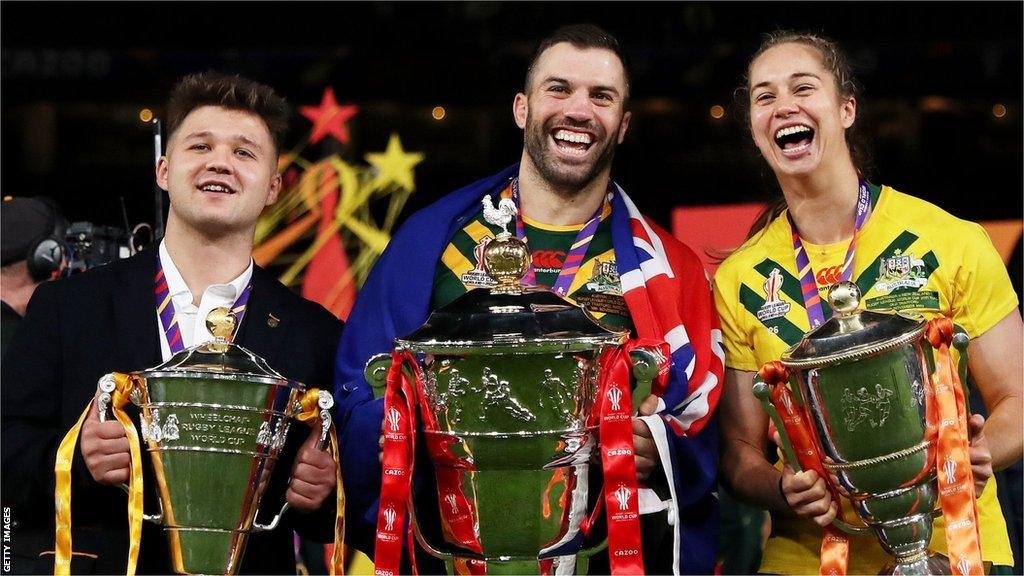Rugby League World Cup: Southern hemisphere to host in 2026 after France withdrawal
- Published

England hosted the Rugby League World Cup in 2022, with Australia being crowned the men's and women's champions and the hosts claiming the wheelchair title
The Rugby League World Cup will be held in the southern hemisphere in 2026.
The Ashes Test series has also been reinstated with England's men and women set to tour Australia in 2025.
Those are two highlights of a new International Rugby League calendar that has been announced after a meeting in Singapore.
Significantly, the IRL say they have the backing of the NRL and the players' union in Australia, the RLPA, to guarantee a new era for the world game.
The next World Cup was due to be staged in France in 2025 but they withdrew after failing to get guaranteed backing from local and national government.
New Zealand signalled their intention to step into the breach by offering to host in 2025 instead.
The International Rugby League, the game's global governing body, now say they want to wait until 2026 to ensure the tournament has the best chance of success.
They say two potential hosts in the southern hemisphere have made bids.
They are likely to be New Zealand and Australia, with a combination of Pacific Nations involved. The IRL say they will not reveal the bidders yet, for commercial reasons, but will choose one of the options available by the end of the year.
The 2026 World Cup will feature a pared back men's tournament, comprising 10 teams. The quarter finalists from RLWC21 - Australia, Samoa, New Zealand, England, Tonga, Fiji, Lebanon, and Papua New Guinea - will qualify automatically.
The likes of France, Scotland, Wales, Ireland and Italy will have have to go through a yet-to-be-devised qualification process.
The women's and wheelchair competitions will have eight teams each.
"The IRL board has made these decisions to create more compelling content and secure the financial future of the international game," IRL Chair Troy Grant said.
"The cancellation of France 2025 has given us an opportunity to refresh the structure of the World Cup and associated tournaments as part of a long-term international calendar that all in the game have been desperately seeking."
The World Cup - men's and wheelchair - will work on a four year cycle going forward, with the following tournament held in 2030.
From 2028 the women's World Cup will be a stand alone event to recognise the "phenomenal rate of growth" in the women's game. The first of those tournaments is likely to staged in the southern hemisphere as well.
Plans for years outside the World Cup cycle include England's men and women to tour Australia in 2025.
It will be the first full Ashes series between an England or Great Britain side and Australia since the Kangaroos toured in 2003, when they secured a three-game whitewash against GB.
New Zealand will tour England in 2027 and the Kangaroos will return for a full series for the first time in a quarter of a century in 2028.
The international cycle begins this year when England entertain Tonga in the autumn, and World Cup finalists Samoa are likely tourists next year.
The IRL said it hoped to place greater emphasis on regional championships and World Cup qualifying tournaments for the Americas, Asia-Pacific, Europe and Middle East-Africa.
Plans for a World Series format are also being developed.
"It is no secret that the Achilles heel for international rugby league for far too long has been the absence of an international calendar," Grant said.
"The ad hoc nature of tournaments and international matches, and the absence of any clarity for nations, players and fans to plan their seasons, is over."
England men's calendar:
2023: England v Tonga - three match series (UK)
2024: England v Samoa - three match series (UK - not yet confirmed)
2025: England v Australia - three match series (Australia)
2026: Rugby League World Cup (southern hemisphere)
2027: England v New Zealand - three match series (UK)
2028: England v Australia - three match series (UK)
2029: England v unconfirmed southern hemisphere nation (UK)
2030: Rugby League World Cup (TBC)
Analysis
Key to this programme of events has been the buy-in from Australia, the clubs and the RLPA - the Australian players' union.
Significantly Peter V'landys, the chairman of the Australian RL Commission, was part of the IRL board that drew up this calendar. And the IRL seems to have a good working relationship with the RLPA.
A far-reaching and stable international calendar is something the game has never had, or at least has never been able to stick to. This calendar gives administrators the chance to better engage with potential TV host-broadcasters and sponsors.
But more importantly, it's genuinely exciting for Rugby League fans who have been starved of regular international rugby that they can plan for.
When Great Britain won memorable Test victories over Australia in 1988 and 1992 they were followed by thousands of British fans, who were dubbed the "Barmy Army" by the Aussie press, the original claimants to that title.
Now fans can begin to prepare not just for a World Cup down under in 2026, but also a tour of the antipodes a year earlier.
It's been a disgrace that the game's greatest international rivalry - an England/GB v Australia Test series - has been allowed to disappear for the last two decades. So there will already be a mouth-watering anticipation for the Kangaroos visit to these shores in 2028.

Goodness Gracious Me: A '90s comedy classic that made TV history
The face you know, the story you don't: The life and legacy of Marilyn Monroe from a modern perspective
